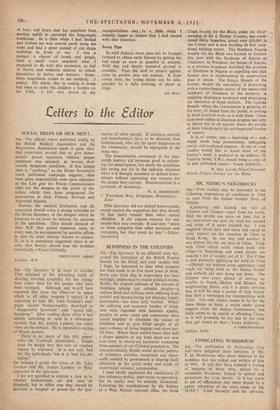BLINDNESS IN THE COLONIES
SIR,—The Spectator in an editorial note wel- comed the formation of the British Empire Society for the Blind, and your readers will, I hope, be interested to hear what progress has been made in its first three years of work. Some may think that its importance has been strikingly emphasised by recent political events. Briefly, the original estimate of the amount of blindness among our colonial peoples—a million blind and millions more suffering from painful and incapacitating eye diseases, largely preventable—has been fully verified. Where the suffering and economic burden of blind- ness were regarded with fatalistic apathy, peoples of every creed and community have joined together to eliminate the causes of blindness and to give blind people of all ages a chance of living happier and more use- ful lives. Where there existed fewer than half a dozen agencies of any kind, there are now over forty in twenty-six territories containing' three-quarters of our Colonial-population. The characteristically British social service pattern of voluntary societies , recognised and finan- cially assisted by government is shaping itself effectively to the social order and needs of multi-racial colonial communities.
I need hardly emphasise the significance of this voluntary-public, inter-racial co-operation, but its reality may be usefully illustrated. Following the establishment by the Society of a West African regional office, the Gold Coast Society for they Blind, under the
manship of Sir J. Henley Coussey, has estab- lished• thirty branches, raised over £10,000 in the Colony and is now building its first voca- tional training centre. The Northern Nigeria Society for the Blind was formed in January this year with the Sardauna of Sokoto. as Chairman; its President, the Sultan of Sokoto, in a wireless broadcast described the problem of blindness in Nigeria, as appalling and that Society also is implementing its constructive plan of action. The Kenya Branch of the Society, despite the emergency, is proceeding with a comprehensive survey of the causes and incidence of blindness in the territory. is initiating dispensary treatment and developing the education of blind children. The Uganda' Branch, where the Government is granting £1 for every £1 raised from the public, is putting in hand practical work on a wide front. These facts must suffice to illustrate progress not only in Africa but in all regions where the people of these islands carry the privileges and burden of empire.
It is, .of course, only a beginning of a task which needs long perseverance, unflagging energy and continued support. If any of your readers would like to know more of the Society's work, a postcard to its address, 53 Victoria Street, S.W.I, would bring a copy of its just published report.—Yours faithfully,


































 Previous page
Previous page